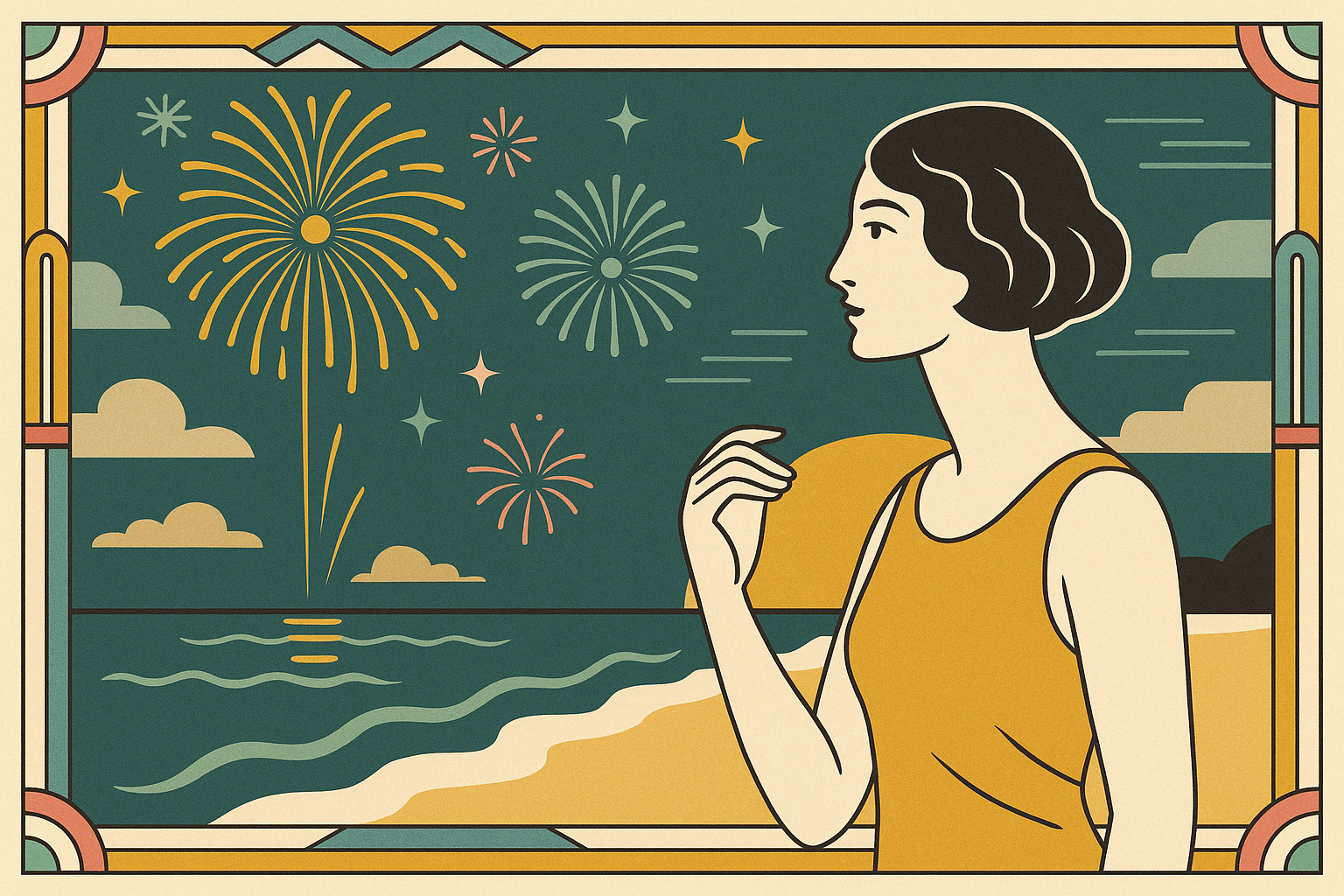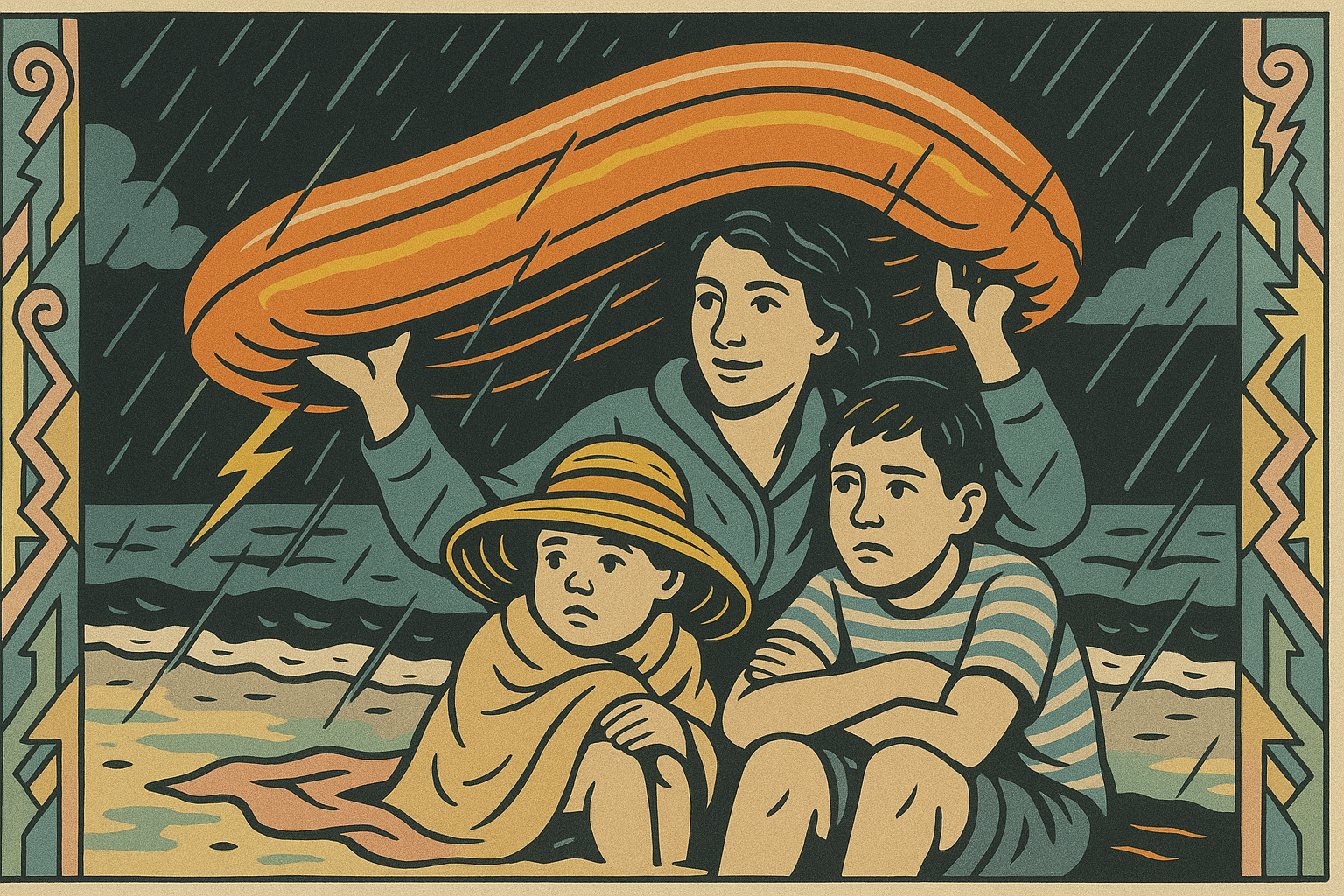Pursuit of Happiness: What It Really Means
The Founding Fathers weren't perfect – but they were right about this.
“If I die tonight, everyone’s going to think I’m insane,” my friend laughs, her lips and teeth dyed electric blue.
Moments earlier, we were sprawled out picnic-style on the grass of her town beach, celebrating the Fourth of July (on the Third). The band played in the background as I ate Goldfish crackers and my friend’s 7-year-old son and his friend devoured spoonfuls of unnaturally bright ice cream. My adult friend chose “Cookie Monster” flavor, which colors her entire mouth electric blue.
Then the first crack of lightning lit up the gray sky.
We’d stayed put through the thunder, hoping the storm would pass so we could stay for the fireworks. But as the lightning continues and the rain begins, we, along with hundreds of others, start folding up the lawn chairs.
“Save yourselves, boys!” my friend says, “I’m too old!”
Earlier in the day, she’d dropped off a car load of beach gear and then we all took the shuttle in. She figures it will be fastest to run back alone through the storm to retrieve the car and come back for us.
Her son watches her disappear into the rainy chaos. Shirtless and wearing his mom’s wide-brimmed beach hat, he looks like a panicked Curious George.
“Hey, guys, we have this,” his friend says, dragging a deflated orange-and-black raft toward us.
“Great idea,” I say, hoisting the raft above our heads. It flops down around us like a damp cave and we huddle together.
My friend’s son’s nerves turn into excitement. He bops in and out of our rubber tent, shrieking with delight. The two boys and I agree we’re a team and, if we go down, we’ll go down together. My friend’s son says an Our Father prayer for the benefit of all of us.
As we play around, I think about how innocent the boys are. I feel grateful they’re not experiencing real emergencies happening on the other side of the world. And I’m grateful to be with them.
The Founding Fathers
Since we’re there for the Fourth of July, I’m also thinking about that famous line from the Declaration of Independence: That we are endowed with certain unalienable rights – life, liberty, and the pursuit of happiness.
The founders of the United States didn’t mean happiness the way we often think of it now – chasing pleasure, possessions, or constant joy. They were talking about a more ancient concept of happiness, influenced by the Stoics and classical philosophers like Cicero. They saw happiness not as a feeling but as a function of character – developing moral excellence, contributing to the greater good, and striving to become your highest self.
Many of them admittedly failed to live up to their ideals, above all by keeping slaves to maintain their lifestyle. But the vision they offered still matters: Long-term happiness – flourishing – comes, not from indulgence, but living with integrity.
And this is why I consider myself a patriotic person – not because I think the United States is perfect, but because I believe in its founding principles and a better future.
One way to live that deeper definition of happiness is to practice gratitude.
Gratitude science
Research by psychologist Robert Emmons, author of Gratitude Works!, found that consistently journaling about what you’re thankful for can increase feelings of happiness by 25%.
You’re training your brain to look for the good, turning away from ‘why me’ victim mode and toward mindful awareness.
The biggest obstacle to feeling grateful, says Emmons, who is the world’s leading scientific expert on the subject – is entitlement. He even refers to Seneca in this chapter of his book:
“The entitlement attitude says, ‘life owes me something’ or ‘people owe me something’ or ‘I deserve this.’ In all its manifestations, a preoccupation with the self can cause us to forget our benefits and our benefactors or to feel that we are owed things from others and therefore have no reason to feel thankful.”
The antidote, he says, is humility: “Becoming aware of realities greater than ourselves shields us from the illusion of being self-made, being here on this planet by right – expecting everything and owing nothing. The humble person says that life is a gift to be grateful for, not a right to be claimed.”
He talks about the importance of taking things ‘as granted’ – as gifts – rather than ‘for granted.’
This echoes a line from Marcus Aurelius’ Meditations:
“Look at what you have, the things you value most, and think of how much you’d crave them if you didn’t have them.” – Marcus Aurelius, Meditations 7.27, Gregory Hays translation.
In other words, as a remedy to taking things for granted, practice wanting what you already have.
A simple gratitude practice
So what is a gratitude practice? Where do we start?
One of my clients told me he tried gratitude journaling but gave up. “You can only be thankful for a sunny day so many times,” he said. He’d been going through the motions, listing the same common things without truly paying attention.
But real gratitude is specific. It’s about noticing what and who brings you joy, growth, or connection.
In his book Flourish, Martin Seligman tells us to go a step further and write about what are you grateful for and why it happened?
For example, “I passed my certification because I studied every day for an hour for one month.”
You’re not just celebrating the outcome – you’re honoring the virtues that helped you: love of learning, perseverance, zest!
Here’s a simple gratitude practice to try:
Each evening, write down one thing you’re grateful for.
If you’re stuck, use the “Who, What, Where, When” prompt:
Who did I get to connect with today?
What did I experience or learn?
Where did I spend my time? Did I visit a favorite place or try something new?
When did I have the most energy?
Then ask: Why did this matter to me? How can I create more of it?
And remember to savor the small moments:
Petting a stranger’s puppy on your morning walk.
A client telling you your work helped them.
Dipping your feet in the ocean on a hot summer evening.
Gratitude in action
Back at the beach, my friend messages us to leave the gear and walk to meet her. We can retrieve it later.
I grab two cooler bags and tell the boys to each grab something. We trudge down the street in the rain like a family of immigrants heading to a new land with only the essentials.
“Well that was a bust,” one of the boys says.
“Was it really?” I ask. “Until it started raining, weren’t we all having fun?”
They nod. We agree we’ve had a great time.
My friend picks us up, and we take turns sharing what we’re grateful for.
“The rain was my favorite part,” her son says.
What had started out as the worst part of the night ended up being the best.
We’d started out with a goal – a pursuit, if you will – of seeing fireworks. But life had other plans. And sometimes, those plans turn out better.
It reminds me of something Marcus wrote in the Meditations:
“What is unique to the good man? To welcome with affection what is sent by fate. Not to stain or disturb the spirit within him with a mess of false beliefs. Instead, to preserve it faithfully…this life lived with simplicity, humility, cheerfulness.” Aurelius, Meditations 3.16, Gregory Hays translation.
The pursuit of happiness isn’t something we buy, or something external that we chase.
It’s something internal that we can practice anywhere, including sheltering beneath a raft as the rain comes down.
Happiness is…
Not a high, but a habit.
Not a feeling, but a way of life.
Communicate with less anxiety and more influence
My work is about helping you share your voice and strengthen your relationships through better communication. Together, we’ll interrupt patterns like perfectionism, fear of judgment, and people-pleasing so you can create lasting change – and feel more at ease in every speaking situation.
I’m an American expat living in the U.K., and I value curiosity, courage, and joy. A few things I love: wandering European streets in search of the best vegetarian meal, practicing Italian, and helping my clients design a life that feels rich and meaningful.
If you're ready to have conversations that open doors – in your career, your relationships, and your life – let’s talk.




